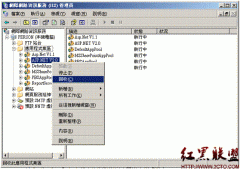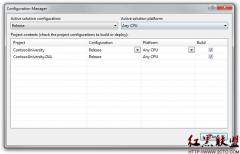【译】MVC3 20个秘方-(14)使用Ajax 提交 Form表单
问题
你有一个网页,列出重要的信息明细,你要允许用户迅速、轻松提交一个表单,无需重新加载整个页面,失去自己在网站上的位置。
解决方案
使用AjaxHelper,创建一个新的Form,用新提交的内容自动更新现有的内容。
讨论
下边的例子把以前的秘方放在一起,向人们展示如何让用户提交一本书的评论,而不重定向到另一个页面去看那些评论以及自己提交的评论。
首先,我们需要创建一个新的model,用于存储对书的评论。在model文件夹,右键->添加->class,命名为:BookComment.cs。这个模型将用于存储对书的评论。代码如下:
using System;
using System.Collections.Generic;
using System.ComponentModel.DataAnnotations;
using System.Linq;
using System.Web;
namespace MvcApplication.Models
{
public class BookComment
{
public int ID { get; set; }
[Required]
public string Comment { get; set; }
public DateTime Created { get; set; }
public int BookId { get; set; }
public virtual Book Book { get; set; }
}
}
下一步,必须更新先前创建的BookDBContext,去对这个表添加一个引用。先前的这个类是创建在原始的BookModel上。因此专门创建一个新的文件来存储这个类是明智的选择。因为它将在您的项目中和未来的表一起继续成长。右键点击Models文件夹。再次,选择添加→类。这个类的名称将BookDBContext:
(译者:不要忘记删除你在Book model里的BookDBContext哦!)
using System;
using System.Collections.Generic;
using System.Data.Entity;
using System.Linq;
using System.Web;
namespace MvcApplication.Models
{
public class BookDBContext : DbContext
{
public DbSet<Book> Books { get; set; }
public DbSet<BookComment> BookComments { get; set; }
}
}
下面,重新build你的解决方案,在下边的步骤里你就可以找到我们新创建的model了。
我们要创建一个新的controller去实现 评论列表并且有能力去管理它们。选择controller文件夹,单击“添加”→“控制器,命名为:BookCommentsController.cs。为了是手工工作最小化。我们将使用Entity Framework 脚手架创建controller。对于Data context class,选择刚才创建的BookDBContext。(译者:Modle class 选择:BookComment (MvcApplication.Models))。点击添加。当你再次运行应用程序时,你将接收到一个错误指示出:BookDBContext已经改变了。为了解决这个问题,你必须为DBContext创建一个initializer(初始化器)。因为这不是一个生产环境的应用程序,初始化器将删除和重新创建数据库。为了实现这个,右击Models文件夹。选择添加->class ,命名为BookInitializer,代码如下:
using System;
using System.Collections.Generic;
using System.Data.Entity;
using System.Linq;
using System.Web;
namespace MvcApplication.Models
{
public class BookInitializer : DropCreateDatabaseIfModelChanges<BookDBContext>
{
}
}
接下来Global.asax.cs要被更新,在Application_Start中去调用BookInitializer,更新Application_Start方法如下:
protected void Application_Start()
{
Database.SetInitializer<BookDBContext>(new BookInitializer());
AreaRegistration.RegisterAllAreas();
RegisterGlobalFilters(GlobalFilters.Filters);
RegisterRoutes(RouteTable.Routes);
}
配置工作完成了,现在我们要做的就是允许用户通过Ajax提交一个评论。我们将从Book/Details view 开始,因为展现评论的大多数逻辑都在这里。(译者:由于原书中引用代码较多,我只在这指出我们更改的代码)。代码如下:
@model MvcApplication.Models.Book
@{
ViewBag.Title = "Details";
}
<h2>
Details</h2>
<fieldset>
<legend>Book</legend>
<div class="display-label">
Title</div>
<div class="display-field">
@Html.DisplayFor(model => model.Title)
</div>
<div class="display-label">
Isbn</div>
<div class="display-field">
@Html.DisplayFor(model => model.Isbn)
</div>
<div class="display-label">
Summary</div>
<div class="display-field">
@Html.DisplayFor(model => model.Summary)
</div>
<div class="display-label">
Author</div>
<div class="display-field">
@Html.DisplayFor(model => model.Author)
</div>
<div class="display-label">
Thumbnail</div>
<div class="display-field">
@Html.DisplayFor(model => model.Thumbnail)
</div>
<div class="display-label">
Price</div>
<div class="display-field">
@Html.DisplayFor(model => model.Price)
</div>
<div class="display-label">
Published</div>
<div class="display-field">
@Html.DisplayFor(model => model.Published)
</div>
</fieldset>
<fieldset>
<legend>Comments</legend>
<div id="Comments">
@{Html.RenderAction("Index", "BookComments",new { BookId = Model.ID });}
</div>
</fieldset>
<p>
@Html.ActionLink("Edit", "Edit", new { id = Model.ID }) |
@Html.ActionLink("Back to List", "Index")
</p>
在上边代码中添加了一个新的<fieldset>,它里边又包含了一个<div>,div的id是”Comments”,在这个div中有一个Html.RenderAction(),它可以通过传递一个BookId参数到BookComment controller的Index action。
接下来,我们需要更新BookComments/Index view。在下边的例子里,Create New link被更新成,通过Ajax替代重定向去展示Form。也会移除一些links,因为我们只需要添加的能力,不需要去管理这些评论。代码如下:
@model IEnumerable<MvcApplication.Models.BookComment>
@{
ViewBag.Title = "Index";
}
<h2>
Index</h2>
<p>
@Ajax.ActionLink("Create New", "Create", new
{
BookId = ViewBag.BookId
},
new AjaxOptions { UpdateTargetId = "AddComment" })
</p>
<div id="AddComment">
</div>
<table>
<tr>
<th>
Comment
</th>
<th>
Created
</th>
</tr>
@foreach (var item in Model)
{
<tr>
<td>
@Html.DisplayFor(modelItem => item.Comment)
</td>
<td>
@Html.DisplayFor(modelItem => item.Created)
</td>
<td>
@Html.DisplayFor(modelItem => item.Book.Title)
</td>
</tr>
}
</table>
最后注意,需要改变的是自动生成的BookComments/Create view。将使用Ajax.BeginForm 去替换默认的Html.BeginForm。另外一件事是告诉当Ajax提交完成时,让Form来调用一个JavaScript:函数ReloadComments()。此函数使用jQuery的Ajax请求来检索更新的评论列表。也要创建一个带BookID的hidden field去替换自动创建的下拉列表。
代码如下:
@model MvcApplication.Models.BookComment
@{
ViewBag.Title = "Create";
}
<h2>
Create</h2>
<script src="@Url.Content("~/Scripts/jquery.validate.min.js")" type="text/javascript"></script>
<script src="@Url.Content("~/Scripts/jquery.validate.unobtrusive.min.js")" type="text/javascript"></script>
<script type="text/javascript">
function ReloadComments() {
$("#Comments").load("@Url.Content("~/BookComments/Index?BookId=" + ViewBag.BookId)");
}
</script>
@using (Ajax.BeginForm(new AjaxOptions
{
OnComplete = "ReloadComments()"
}))
{
@Html.Hidden("BookId", (int)ViewBag.BookId);
@Html.ValidationSummary(true)
<fieldset>
<legend>BookComment</legend>
<div class="editor-label">
@Html.LabelFor(model => model.Comment)
</div>
<div class="editor-field">
@Html.EditorFor(model => model.Comment)
@Html.ValidationMessageFor(model => model.Comment)
</div>
<p>
<input type="submit" value="Create" />
</p>
</fieldset>
}
为了完成这个例子,我们还需要在BookCommentsController更新一些代码:
(译者:作者为嘛总是说最后一步,都多少个最后一步了,别急,马上就完成了 )
using System;
using System.Collections.Generic;
using System.Data;
using System.Data.Entity;
using System.Linq;
using System.Web;
using System.Web.Mvc;
using MvcApplication.Models;
namespace MvcApplication.Controllers
{
public class BookCommentsController : Controller
{
private BookDBContext db = new BookDBContext();
//
// GET: /BookComments/
public ActionResult Index(int BookId)
{
ViewBag.BookId = BookId;
var bookcomments = db.BookComments.Include(
b => b.Book).Where(b => b.BookId == BookId);
return PartialView(bookcomments.ToList());
}
//
// GET: /BookComments/Create
public ActionResult Create(int BookId)
{
ViewBag.BookId = BookId;
return PartialView();
}
//
// POST: /BookComments/Create
[HttpPost]
public ActionResult Create(BookComment bookcomment)
{
if (ModelState.IsValid)
{
bookcomment.Created = DateTime.Now;
db.BookComments.Add(bookcomment);
db.SaveChanges();
}
ViewBag.BookId = bookcomment.BookId;
return PartialView(bookcomment);
}
protected override void Dispose(bool disposing)
{
db.Dispose();
base.Dispose(disposing);
}
}
}
在上面的例子中,Index Action已更新,接受整数的参数BookID。这被设置到ViewBag。另一个重要变化是,返回一个partial view 替代 返回完整的view(阻止完整的layout显示)。如果你还记得在前面的例子,我们重用了相同的view执行Ajax请求,并在视图中检查,看它是否是一个Ajax请求去禁用layout。因为这个view是只通过Ajax显示,更新controller去返回一个partial view是简单的。
最后,Create action也被更新。基本的Create action就像Index action一样 接收一个BookID,并返回一个partial view。第二,Create函action已被更新去设置评论的创建日期。如果有错误,返回一个partial view。Edit,details和delete action已经被移除了,因为没用到他们。这些View也可以删除,因为他们也没有被使用。
现在,当用户浏览一本书的细节,他们可以看到全部评论
已发布的,如果他们想添加自己的意见,他们可以看到已经评论的列表。如果他们想添加自己的内容,他们可以点击create new link,输入他们的内容,提交,并且自动的看到他们刚提交的内容而不需要离开book详细页。
相关新闻>>
- 发表评论
-
- 最新评论 进入详细评论页>>



